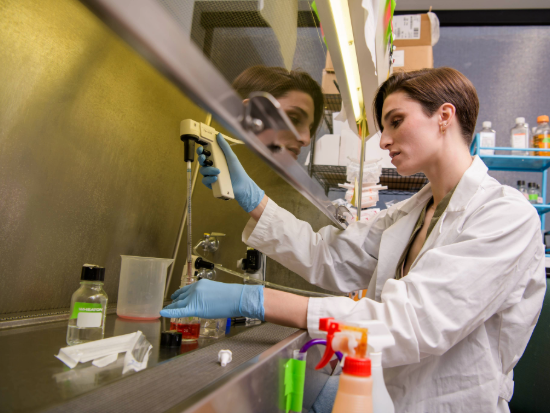 Lochlain Corliss, a Ph.D. candidate in the UAB Department of Microbiology, recently received an F31 grant from the NIH. Corliss is a trainee in the lab of Nicholas Lennemann, Ph.D., assistant professor in the UAB Department of Microbiology.Lochlain Corliss, a Ph.D. candidate in UAB’s Graduate Biomedical Sciences program, was recently awarded a prestigious two-year F31 grant from the NIH for her research titled “Elucidating the proteolytic determinants of flavivirus infection.” Corliss is training in the lab of Nicholas Lennemann, Ph.D., assistant professor in the UAB Department of Microbiology.
Lochlain Corliss, a Ph.D. candidate in the UAB Department of Microbiology, recently received an F31 grant from the NIH. Corliss is a trainee in the lab of Nicholas Lennemann, Ph.D., assistant professor in the UAB Department of Microbiology.Lochlain Corliss, a Ph.D. candidate in UAB’s Graduate Biomedical Sciences program, was recently awarded a prestigious two-year F31 grant from the NIH for her research titled “Elucidating the proteolytic determinants of flavivirus infection.” Corliss is training in the lab of Nicholas Lennemann, Ph.D., assistant professor in the UAB Department of Microbiology.
The NIH created the highly competitive F31 for predoctoral researchers in the biomedical, behavioral, or clinical sciences currently enrolled in a Ph.D. or equivalent research degree program. It funds mentored research experiences and serves to support trainees in their development into independent researchers.
Corliss, who received her Bachelor of Science from Emmanuel University in 2020, joined Lennemann’s lab in January 2021. She was his first graduate student, after he founded the lab in March 2020—just two weeks before the work-from-home order was put in place due to the COVID-19 pandemic.
“Since the lab had only been truly active for approximately six months before her arrival, we hadn’t yet established a lab culture,” Lennemann recalled. “That changed a few days after having Lochlain in the lab. Her personality, engagement, and energy were a perfect fit. These qualities have helped to set the tone as the lab continues to grow, which has made our lab a unique environment – hard work and high energy.”
Corliss has since authored two scientific publications, one as first author in October 2022 and the second as second author in January 2023, with several manuscripts in progress.
“Her hard work and dedication to experiments and project development during her time in the lab while critically thinking about her research when not in the lab have inspired me and influenced the others in the lab,” Lennemann said.
Corliss elaborates on her F31 award and the research it will support.
Give us an overview of your research, specifically as it pertains to the F31 grant.
Corliss: Flaviviruses are a large family of RNA viruses that are significant global pathogens, infecting up to 400 million people a year. The flavivirus protease is an essential non-structural protein that is an attractive target for antiviral therapeutics; however, the intracellular molecular determinants for flavivirus protease cleavage of substrates and how these factors affect viral fitness is unknown. The purpose of my research as it pertains to the F31 is to understand the proteolytic determinants of flavivirus infection to uncover potential pathways that can be exploited in the development of antiviral therapies targeting this viral protein.
How will this grant propel your research goals going forward?
Corliss: Coming from very humble beginnings in the context of my research background, the most significant impact that this award has had and will continue to have is that it has given me the confidence to believe that I could find my place in the incredibly competitive space of academia.
Anything else you’d like to add?
Corliss: I want to shout out my lab mates, Sam Mehri, Brooke Bengert, and Madeline Holliday for making our lab such an enjoyable environment where I am excited to come to work every day and collaborate with my peers.
I sincerely want to thank Dr. Todd Green, Dr. Carrie Coleman, and Dr. Chad Petit for their influential letters of support for me and my proposal. It is also important to acknowledge Dr. Kevin Harrod, the co-mentor of my F31, and the importance that his role played in the success of the application.
Finally, I must express my most sincere gratitude towards (Lennemann) for his mentorship. He has been the most influential piece in my development as a scientist. I will always be grateful to have been mentored by someone who cares so deeply about his students and their technical/intellectual development.